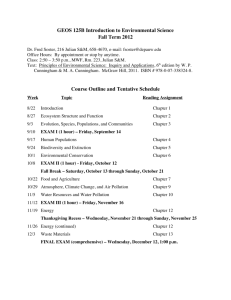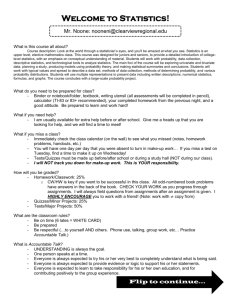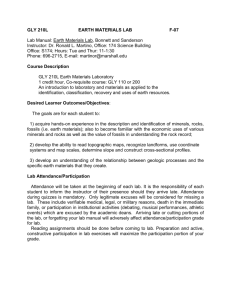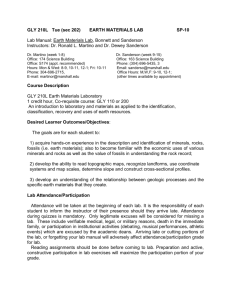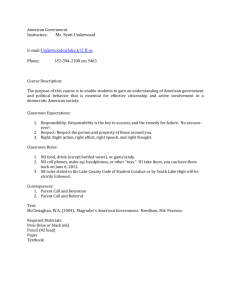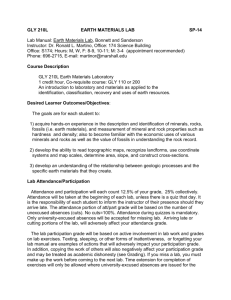GEOS 110 Earth and the Environment Fall Term, 2013 Dr. Fred Soster
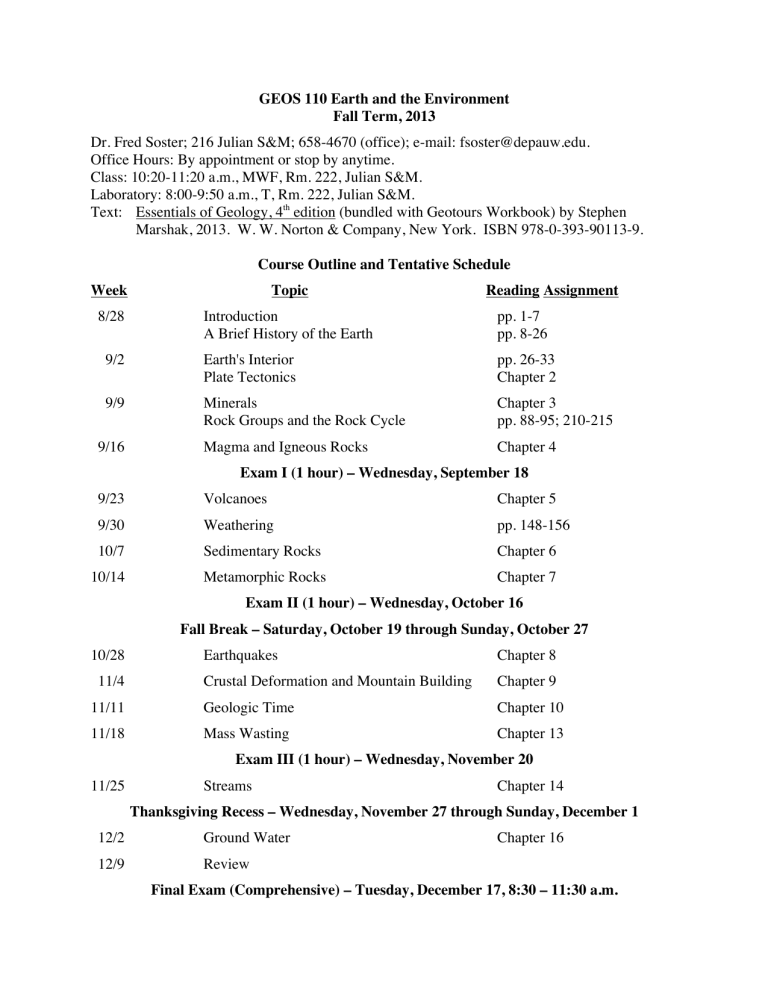
8/28
9/2
9/9
9/16
GEOS 110 Earth and the Environment
Fall Term, 2013
Dr. Fred Soster; 216 Julian S&M; 658-4670 (office); e-mail: fsoster@depauw.edu.
Office Hours: By appointment or stop by anytime.
Class: 10:20-11:20 a.m., MWF, Rm. 222, Julian S&M.
Laboratory: 8:00-9:50 a.m., T, Rm. 222, Julian S&M.
Text: Essentials of Geology, 4 th edition (bundled with Geotours Workbook) by Stephen
Marshak, 2013. W. W. Norton & Company, New York. ISBN 978-0-393-90113-9.
Course Outline and Tentative Schedule
Week Topic Reading Assignment
9/23
9/30
10/7
10/14
Introduction
A Brief History of the Earth
Earth's Interior
Plate Tectonics
Minerals
Rock Groups and the Rock Cycle pp. 1-7 pp. 8-26 pp. 26-33
Chapter 2
Chapter 3 pp. 88-95; 210-215
Magma and Igneous Rocks Chapter 4
Exam I (1 hour) – Wednesday, September 18
Volcanoes
Weathering
Chapter 5 pp. 148-156
Sedimentary Rocks
Metamorphic Rocks
Chapter 6
Chapter 7
Exam II (1 hour) – Wednesday, October 16
10/28
11/4
11/11
11/18
Fall Break – Saturday, October 19 through Sunday, October 27
Earthquakes Chapter 8
Crustal Deformation and Mountain Building Chapter 9
Geologic Time Chapter 10
Mass Wasting Chapter 13
11/25
Exam III (1 hour) – Wednesday, November 20
Streams Chapter 14
12/2
Thanksgiving Recess – Wednesday, November 27 through Sunday, December 1
Ground Water Chapter 16
12/9 Review
Final Exam (Comprehensive) – Tuesday, December 17, 8:30 – 11:30 a.m.
Course Goals
The goal of this course is to increase your understanding of planet Earth. You will learn about the materials that make up our planet and the processes that operate upon and within the planet to produce the various landforms and geological events that we witness daily. The basic concepts that you learn in this course combined with careful observation and an inquisitive mind will enable you to understand much of what you see in the natural world. Furthermore, in studying geology, I hope that you gain a deeper understanding of science in general. You should be able to differentiate between hypothesis and theory, and facts and interpretations. You should understand the scientific method, learn how science is actually done, and see the many ways that science is relevant to all our lives.
Course Organization
We will meet Monday, Wednesday, and Friday from 10:20-11:20 a.m. for lecture and discussion. Laboratory activities will take place on Tuesday from 8:00-9:50 a.m.
Grading
Your course grade is based on numerous in-class quizzes, three semester exams, geotours worksheets, laboratory assignments, three laboratory quizzes, and a comprehensive final exam.
These components are weighted as follows:
Exam I
Exam II
15%
15%
Exam III
Final Exam
Geotours Worksheets
Lab Quizzes (3)
15%
20%
10%
15%
Lab Assignments (4) 10%
A = ≥ 90%; B = 80-89%; C = 70-79%; D = 60-69%; F = < 60%
( Note : I will lower these ranges slightly if warranted by the class grade distribution.)
Q Certification
You must successfully satisfy both of the following criteria to receive Q certification:
1. Average 75% on the geotours worksheets, lab assignments, and lab quizzes.
2. Receive a course grade of C- or better.
2
Date
10/29
11/5
11/12
11/19
11/26
12/3
12/10
9/3
9/10
9/17
9/24
10/1
10/8
10/15
Lab #
7
8
9
10
11
12
13
14
4
5
6
1
2
3
Laboratory Schedule
Topic
Introduction to Geotours.
Measuring the Earth Using a GPS.
Minerals.
Minerals.
LAB QUIZ I : Minerals.
Rocks.
Rocks.
Field trip to Shades State Park.
LAB QUIZ II : Rocks.
Field Trip to DePauw Nature Park.
Earthquakes.
Topographic Maps.
Streams.
LAB QUIZ III : Comprehensive.
3
Class Policies
1. Regular attendance is expected. I do monitor attendance. Poor attendance and preparation for class will result in refusal on my part to give you reasonable attention and guidance in make-up work. See the Student Handbook for the University policy on attendance.
2. Cell phone and computer use during class are not allowed. Turn them off and put them away. My phone is set to vibrate in the event of an emergency message broadcast from
DePauw Public Safety.
3. Late assignments will not be accepted. You will receive a grade of "0."
4. Make-up examinations are normally not given; however, I will consider requests for make-up exams on a case-by-case basis.
5. Academic integrity is expected. Students are encouraged to work and study together, particularly in the laboratory where discussions can enhance learning. However, you should submit your own work for grading. Violations will be handled in accordance with established University procedures as described in the Student Handbook.
Keys to Success in this Course
1. Read the Assigned Material in the Textbook in advance of lecture over that material. As you're reading, note any questions that you have.
2. Ask Questions . The only stupid question is one that is not asked. Because you will be responsible for material in each assigned chapter whether that material is specifically covered during lecture or not, it is essential to ask questions to clarify any concepts that you do not understand. PLEASE do not be too shy, embarrassed, intimidated, afraid, etc. to ask questions.
3. Take Good Notes . Students with complete notes seem to do better in class. Try to write down the key material from the lecture and include as many sketches as possible. Rewriting your notes will make them more legible and orderly, plus it will help you focus on areas that are still unclear. Be careful of falling into "TV-watching mode", as it is easy to look at the pictures and not take down any notes.
4. Know the Key Terms at the end of each chapter (these are in bold in the chapter text). I will expect everyone to know these terms before I begin lecture and so I will not define the majority of the terms in lecture. If I use a term that you don't understand, PLEASE ASK me to define it.
5. Use the Glossary in the back of the book to help understand key terms.
6. Check out the Internet . The companion web site for our text is http://www.wwnorton.com/studyspace. On this web site are additional materials & quizzes that will help enhance your understanding of the chapters. There also are lots of animations
4
that illustrate various processes that we will discuss in class. I strongly recommend that you use this site. You also can use a search engine to find additional web sites of interest.
7. Create your own Study Aids . Some people like to highlight text in the chapter, others like to make flash cards (these are available at the website mentioned in #6 above), and still others like to study in groups and discuss the material. Feel free to experiment with what works for you. In addition, the Academic Resource Center in Harrison Hall (2nd floor) has
Q tutors and trained people available to help you refine and improve your study habits and techniques. Because different people have different learning styles and because I am not trained in that field, I struggle to help people with questions like "I studied really hard for this test, but I still got a bad grade. What should I do?" (in fact, the intent of this is to avoid this problem). I'm much more adept at answering geology-specific questions like "I've read the book and I don't understand strike-slip faults. Can you explain them?"
8. Study the Material on a Regular Basis . Maintain good study habits by regularly working with the assigned material. “Cramming” just doesn’t work for most of us. Get comfortable with the material as we go along so that you don't fall behind.
9. Assess Your Learning Weekly . Do this by taking the online multiple choice quizzes and by writing out the answers to the review questions at the end of each chapter. I will post the correct answers to the review questions on moodle each week. If you do not understand any of the answers after checking the chapter text, PLEASE ASK me.
10. Study for exams and quizzes as an Individual and then as a Group . Different people study in different ways. I've found that it helps to study as an individual first (thinking about and learning the important concepts that were emphasized in each chapter & lecture), then get together with others and study as a group (e.g., asking each other questions, brainstorming about what will be on the test, etc.).
If you feel lost or frustrated with any aspect of this course, please talk to me so that we can work together to resolve your difficulties.
DePauw University is committed to providing equal access to academic programs and
University administered activities with reasonable accommodations to students with disabilities, in compliance with the Americans with Disabilities Act and Amendments
(ADAAA). Any student who feels she or he may need an accommodation based on the impact of a disability or learning challenge is strongly encouraged to contact Pamela
Roberts, Coordinator of Student Disability Services for further information on how to receive accommodations and support. Student Disability Services is located at 101 E.
Seminary St., 765-658-6267.
5
